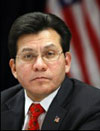|
|
|
Google Buys Videoconferencing Tech
Venture Business News |
2007/04/21 01:08
|
| Google has bought Swedish IT company Marratech for over 100 million kronor (about 14.5 million U.S. dollars), local media reported on Friday. The deal also means that Google will assume responsibility for Marratech's employees, Swedish news agency TT reported. "It's a wonderful opportunity for us. We couldn't have dreamed of getting a better partner," Peter Parnes, one of the founders of Marratech, told TT. Marratech, founded in 1998, makes software for electronic conferences. |
|
|
|
|
|
|
Judges’ ruling requires ID to register to vote
Breaking Legal News |
2007/04/21 01:00
|
| The US Court of Appeals for the Ninth Circuit held late this week that Arizona may enforce its voter identification law while a non-profit organization challenges the law in federal court. The law, which Arizonans approved in 2004 as Proposition 200, requires voters to show a government-issued ID at the polls. The Ninth Circuit ruling was filed Thursday. Opponents of the law have called it a "21st century poll tax," since it requires people to purchase photo ID cards, and have argued that the law places an unconstitutional burden on minority, immigrant and elderly voters. Proponents say it prevents illegal immigrants from casting ballots. Last year, the US Supreme Court ruled that Arizona could enforce the law at the polls for the November elections, reversing a Ninth Circuit decision rendered earlier that month. |
|
|
|
|
|
|
Samsung exec pleads guilty in DRAM scandal
Business |
2007/04/20 12:18
|
| A sixth executive from Samsung Electronics Co. Ltd. has agreed to plead guilty to participating in a global conspiracy to fix DRAM prices, the Department of Justice announced. Il Ung Kim, a Korean executive, has agreed to serve 14 months in a United States prison, the longest imprisonment ever by a foreign defendant charged with price fixing in the United States, according to the DOJ. Kim, vice president of marketing for the memory division at Samsung, agreed to plead guilty to a single count of price fixing. As part of his plea agreement, Kim agreed to pay a $250,000 criminal fine and to assist prosecutors in the ongoing investigation. The entry of the plea agreement and sentencing is currently scheduled for April 25, 2007. The plea and recommended sentence must be approved by the court. Kim agreed to plead guilty to the charge contained in an indictment filed in U.S. District Court in San Francisco in October 2006. Kim was charged with participating in a conspiracy to suppress and eliminate competition by fixing the prices of DRAM to be sold to certain original equipment manufacturers (OEMs) of personal computers and servers, in violation of the Sherman Antitrust Act. To date, the court has imposed criminal fines totaling more than $730 million against the DRAM cartel members, which is the second-largest total amount of fines ever imposed in a U.S. criminal antitrust investigation. A total of 18 individuals and four companies have been charged as a result of the Department's ongoing antitrust investigation into the DRAM industry. In November 2005, Samsung pleaded guilty to participating in the price- fixing conspiracy and was sentenced to pay a $300 million criminal fine in November 2005. A second Korean manufacturer, Hynix Semiconductor Inc., pleaded guilty and was sentenced to pay a $185 million criminal fine in May 2005. In October 2004, German manufacturer Infineon pleaded guilty and was sentenced to pay a $160 million criminal fine. In January 2006, Japanese manufacturer Elpida Memory pleaded guilty and was sentenced to pay an $84 million fine. Of the 18 individuals that have been charged in the DRAM investigation, 15 individuals have been convicted. Kim is the first of three defendants charged in the October 2006 indictment to plead guilty. A trial against Kim's co- defendant Gary Swanson, senior vice president of memory sales and marketing for Hynix Semiconductor America Inc., is scheduled for Sept. 10, 2007. A third defendant charged in the October 2006 indictment, Young Bae Rha, a Korean national and the vice president of sales and marketing for Samsung's memory division, remains at large. Kim is the sixth Samsung executive to agree to plead guilty and agree to a prison sentence in the DRAM investigation. In April 2006, Sun Woo Lee and Yeongho Kang pleaded guilty to participating in the price-fixing conspiracy while they worked for Samsung or its subsidiaries in the U.S. |
|
|
|
|
|
|
Mayer, Brown, Rowe & Maw advises Aeroflot
Law Firm News |
2007/04/20 12:08
|
International law firm Mayer, Brown, Rowe & Maw LLP advised Aeroflot Russian Airlines JSC and its consortium partner, UniCredit Banca Mobiliare S.p.A. on a non-binding offer to acquire the Italian State's interests in Alitalia.The Italian State invited expressions of interest for the purchase of (i) a shareholding of not less than 39.9% and no more than 49.9% in Alitalia - Linee Aeree Italiane S.p.A. ("Alitalia") and (ii) 1,207,147,404 convertible bonds issued under the debenture loan known as "Alitalia 7.5% 2002-2010". Non-binding offers were to be submitted by 16 April 2007. Mayer, Brown Rowe & Maw and Italian co-counsel Tonucci & Partners, with which it has an established independent alliance, worked with Roland Berger, strategy consultants, to advise Aeroflot and its consortium partner, UniCredit Banca Mobiliare S.p.A. Brussels based partners Kiran Desai and Edward Borovikov, assisted by Nunzio Bambara, led the team for Mayer, Brown, Rowe & Maw, whilst Rome based partners Marco Nicolini and Giorgio Alù assisted by Andrea Rosi and Francesco Fiore based in Milan led the team for Tonucci & Partners.
www.mayerbrown.com |
|
|
|
|
|
|
Democrats raise more money in 2007 first quarter
Politics |
2007/04/20 11:11
|
| For the first time since the so-called passage of campaign finance reform in 2002, U.S. national Democrats have outpaced their Republican rivals in the race for campaign cash in the first three months of an election cycle, The Washington Post reported Friday. Democrats collected 47.7 million U.S. dollars through the Democratic National Committee (DNC) as well as their House and Senate campaign arms, while the Republicans' three committees brought in 47.4 million dollars, the report said, citing figures provided by the organizations. During a similar time frame in 2005, Republicans raised 62 million dollars through their national and congressional committees, and Democrats about 32 million dollars. At the end of the first quarter of 2003, the Republican advantage was bigger: 54million dollars to the Democrats' 19 million dollars. The Democrats' fundraising gains were most evident at congressional level. The Democratic Senatorial Campaign Committee (DSCC) raised 13.7 million dollars to the National Republican Senatorial Committee's 7 million dollars. The DSCC also ended March with nearly triple the money in the bank -- 9.5 million dollars to 3.45 million dollars. The House picture was not much better for Republicans. The Democratic Congressional Campaign Committee collected 19 million dollars between January and March and had 9.8 million dollars in the bank. The National Republican Congressional Committee raised 15.8 million dollars in the quarter and had 2.5 million dollars to spend. The Republican National Committee (RNC) was the lone saving grace for Republicans' financial hopes, raising 24.6 million dollars in the period -- nearly 10 million dollars more than the DNC. The RNC closed March with 12.8 million dollars, against the DNC's 6.9 million dollars. In the presidential race, leading Democrat candidates also enjoyed a money advantage over their Republican rivals. From January to March this year, Democrat Senators Hillary Clinton, of New York, and Barack Obama, of Illinois, raised 26 million dollars and 25.7 million dollars respectively for their presidential campaigns. The only Republican candidate who raised more than 20 million dollars during the three-month period was Mitt Romney, a former Massachusetts governor, who raised 20.7 million dollars. |
|
|
|
|
|
|
Gonzales doesn't satisfy critics - GOP or Dems
Legal Business |
2007/04/20 11:10
|
| The Bush White House called embattled Attorney General Alberto Gonzales "our No. 1 crime fighter" Friday, a day after Gonzales' often halting explanations for the firings of eight federal prosecutors brought additional demands for his resignation. "He has done a fantastic job in the Department of Justice," deputy press secretary Dana Perino told reporters traveling aboard Air Force One as President Bush headed for a speech in Michigan. Gonzales had gone to Capitol Hill Thursday with just one mission: to placate Republican and Democratic senators dissatisfied with his account of how eight federal prosecutors were fired. Apparently, he failed. For the first time, Republicans on the Judiciary Committee broke ranks and said it might be best if Gonzales stepped down. "It is generous to say the attorney general's communications about this matter have been inconsistent," Sen. Tom Coburn, R-Okla., told Gonzales in a packed hearing room Thursday. "The consequence should be the resignation of the attorney general." Sen. Jeff Sessions, R-Ala., said in an interview after the hearing, "There are some problems that he just hasn't handled well, and it might just be best if he came to a conclusion that the department is better served if he's not there." Some of the committee's biggest questions went unanswered: How exactly did the Justice Department settle on the eight prosecutors who were fired? Does Gonzales have command of his agency? "You have been a forceful witness, and you have had a lot of staying power," Sen. Arlen Specter, the ranking Republican on the committee, said near the end of Gonzales' seven hours of testimony. "But we haven't gotten, really, answers," added Specter, R-Pa. "I urged you to put on the record the details as to all the U.S. attorneys you asked to resign so that we could evaluate. And you have not done that." Specter threw Gonzales a thin lifeline, declining to call for his resignation but making it clear that he thinks there's little argument for Gonzales keeping his post. "His ability to manage the department has been severely undercut by the way he has handled these resignations and by the way he has handled his news conferences, his press statements and his testimony before the committee," Specter said.
|
|
|
|
|
|
|
Indian company buys U.S. iron ore firm
World Business News |
2007/04/20 10:07
|
Essar Global Ltd, India's leading industrial company, has signed an agreement to acquire Minnesota Steel LLC, a U.S.-based iron ore firm, local media reported Thursday. According to Daily News Analysis published in Mumbai, the deal will cost Essar Global 80 million to 90 million dollars. The Minnesota Steel LLC controls 1.4 billion tons of iron ore in the Mesabi Iron Range in northeast Minnesota in the United States. "Our investment in Minnesota Steel is exciting as it gives us a cornerstone in the North American market. From this we will further expand our global steel business," said Shashi Ruia, Essar Global chairman. Moreover, the deal marked the first step of Essar Global to setup steel making facility with an annual capacity of 1.5 million tons and investment of 1.65 billion U.S. dollars. The facility will include iron ore mining, ore processing, direct reduction and steel making on a single site. |
|
|
|
|
|
|
Class action or a representative action is a form of lawsuit in which a large group of people collectively bring a claim to court and/or in which a class of defendants is being sued. This form of collective lawsuit originated in the United States and is still predominantly a U.S. phenomenon, at least the U.S. variant of it. In the United States federal courts, class actions are governed by Federal Rules of Civil Procedure Rule. Since 1938, many states have adopted rules similar to the FRCP. However, some states like California have civil procedure systems which deviate significantly from the federal rules; the California Codes provide for four separate types of class actions. As a result, there are two separate treatises devoted solely to the complex topic of California class actions. Some states, such as Virginia, do not provide for any class actions, while others, such as New York, limit the types of claims that may be brought as class actions. They can construct your law firm a brand new website and help you redesign your existing law firm site to secure your place in the internet. |
Law Firm Directory
|
|










